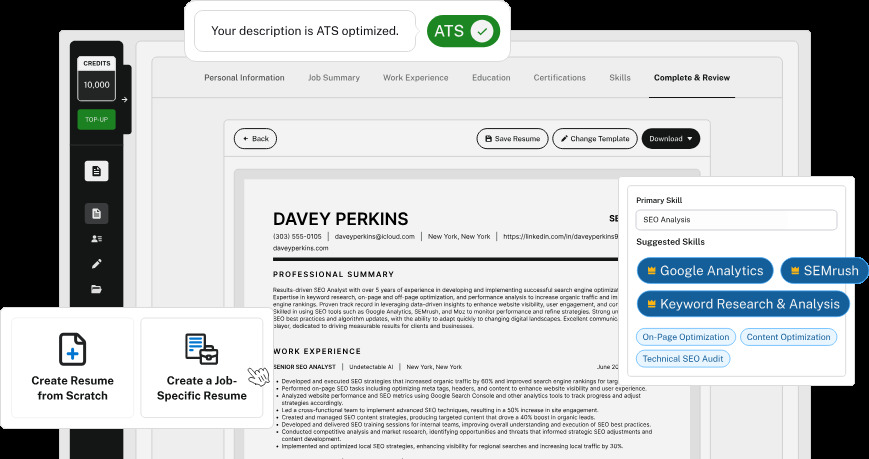Tech professionals are some of the most well-compensated players in today’s job market. And we’re not talking about vague “competitive salaries” here.
We’re talking real numbers, six figures, often starting salaries, with room to grow fast.
Companies across every industry—healthcare, finance, retail, entertainment—are now, at their core, tech companies.
They need people who can build systems, secure data, manage infrastructure, and pull insights from oceans of information.
So, tech pays, and it pays well.
If you’re wondering what do technology jobs pay, what tech roles are truly worth chasing, and how to build the skills that get recruiters calling, this is where it starts.
Let’s start by understanding why tech jobs offer competitive salaries.
Why Tech Jobs Offer Competitive Salaries
Unlike many roles where compensation is tied to hours worked, tech roles are tied to impact.
- A well-optimized algorithm can save a company millions.
- A secure cloud infrastructure can prevent devastating breaches.
- A machine learning model can unlock entirely new revenue streams.
The demand for skilled tech workers also massively outweighs the supply.
As digital transformation sweeps across industries, from finance to healthcare to logistics, companies are racing to hire engineers, data scientists, DevOps experts, and cybersecurity professionals who can build and maintain future-ready systems.


Never Worry About AI Detecting Your Texts Again. Undetectable AI Can Help You:
- Make your AI assisted writing appear human-like.
- Bypass all major AI detection tools with just one click.
- Use AI safely and confidently in school and work.
On top of that, tech jobs often offer built-in scalability: remote flexibility, employee ESOPs, stock options, performance bonuses, and rapid upward mobility.
The more value created, the faster the compensation grows.
How Tech Salaries Compare to Other Industries
The U.S. Bureau of Labor Statistics says that between 2023 and 2033, computer and IT roles are expected to grow much faster than most other careers, with around 356,700 job openings each year.
As for the money, the median salary for tech jobs hit $104,420 in 2023, i.e., more than double the average across all U.S. occupations ($48,060).
Key Skills That Increase Earning Potential in Tech
If you’re aiming to level up your paycheck in tech, the skills you stack matter a lot.
Employers don’t throw six-figure salaries at anyone who can write code, they pay top dollar for specific, high-impact skills.
Cloud computing, machine learning, data engineering, cybersecurity, and DevOps are the skillsets that power scalability and automation at massive levels.
Statista reports that in 2023, a solid 74% of IT professionals around the world were betting that data analytics and big data skills would see the biggest jump in demand due to the rise of generative AI.
A candidate’s fluency in tools like AWS, Kubernetes, Python, SQL, and TensorFlow makes their resume hard to ignore.
The business school you attend has an impact on your tech salary. Some schools have tighter connections with big-name tech recruiters, and some simply offer more tech-focused courses that make grads extra hireable.
For example, Stanford MBA grads lead the pack with a jaw-dropping median tech salary of $177,500. Not far behind are alumni from Italy’s SDA Bocconi at $174,000.
Average Salaries for Popular Technology Jobs
What average salary do technology jobs pay?
According to the latest numbers from the U.S. Bureau of Labor Statistics, the average median pay for popular technology jobs is as follows:
| Occupation | Median Pay |
| Computer and information research scientists | $145,080 |
| Computer network architects | $129,840 |
| Computer programmers | $99,700 |
| Computer support specialists | $60,810 |
| Computer systems analysts | $103,800 |
| Database administrators and architects | $117,450 |
| Information security analysts | $120,360 |
| Network and computer systems administrators | $95,360 |
| Software developers, quality assurance, and testers | $130,160 |
| Web developers and digital designers | $92,750 |
Now, what do technology jobs pay per month? According to Glassdoor, the estimated pay range for anyone in tech is between $55,000 to $103,000 or more depending on the experience.
When we break it down to pay per month, the average monthly pay for a tech role is between $4,500–$8,500.
Highest-Paying Tech Jobs & How to Get Them

Tech roles that rake in serious pay solve complex, high-stakes problems—usually at scale.
Here’s the lowdown on what do technology jobs pay for different roles and how to get them:
- AI/ML Engineer
Companies throw cash at this role because it fuels their core product or their next big innovation.
AI/ML engineers build systems that learn from data, like how Netflix recommends your next binge or how autonomous cars avoid hitting things.
- Skills Needed: Python, TensorFlow/PyTorch, math (linear algebra, stats), ML algorithms
- Education: Bachelor’s in CS/Math is common, but self-taught + projects = totally viable
- Certs (Optional): TensorFlow Developer Certificate, DeepLearning.ai specializations
- Cloud Architect
Every business is migrating to the cloud. If you know how to architect scalable, secure systems on AWS, Azure, or GCP and effectively leverage cloud monitoring tools to maintain performance, detect threats, and ensure uptime, you’re the MVP.
- Skills Needed: AWS/GCP/Azure, Docker, Kubernetes, security, networking
- Education: Bachelor’s in CS/IT helps, but certifications + real experience > degree
- Must-Have Certs: AWS Certified Solutions Architect – Associate (or Pro), GCP Architect
- Cybersecurity Engineers
Companies lose millions to breaches annually. If you can prevent that, you’re invaluable, especially in healthcare, finance, and now, AI startups.
Because cyber threats are global, your documentation and threat reports often need to be shared with international teams.

You can use our Undetectable AI’s Translator to help you understand international job descriptions and salary data for high-paying tech careers abroad.
It ensures your security findings are communicated with the correct technical terminology, whether you’re reporting to a headquarters in London or a security hub in Singapore.
- Skills Needed: Network protocols, penetration testing, threat modeling, scripting
- Education: Bachelor’s in CS or InfoSec is typical. Bootcamps work, too.
- Certs: CompTIA Security+, CEH, OSCP, CISSP (for senior roles)
- Data Scientists
Data Scientists analyze structured and unstructured data to extract actionable insights and support data-driven decision-making.
They collaborate with business stakeholders to translate complex data into clear, impactful solutions.
- Skills Needed: Python, SQL, Pandas, Machine Learning, visualization (Tableau)
- Education: Bachelor’s in Stats/CS/Engineering; MS helps, but projects > papers
- Certs: Google Data Engineer, IBM Data Science Professional Certificate
- DevOps Engineer
You’ll automate and streamline the software delivery process and ensure code gets from a developer’s laptop to production reliably and securely.
When things break, you’re the one fixing it, fast.
- Skills Needed: CI/CD tools (Jenkins, GitHub Actions), Docker, Kubernetes, Terraform
- Education: Bachelor’s in IT/CS is nice. Many DevOps pros also come from sysadmin backgrounds
- Certs: Kubernetes Certified Administrator (CKA), AWS DevOps Engineer
Why AI & Cloud Computing Jobs Have the Highest Salaries
Businesses are trying to incorporate AI into everything: customer service bots, fraud detection systems, product recommendations, you name it.
Frankly, this kind of automation saves millions.
Building and fine-tuning such AI models takes serious brainpower.
You need people who understand data science, data pipelines, model training, neural networks, and real-world deployment.
The combination of these skills aren’t easy to find. In fact, most companies are desperate for talent that can turn AI from theory into profit.
So, AI roles regularly cross the $150K+ mark, even for mid-level positions.
Similarly, managing cloud infrastructure isn’t plug-and-play.
It requires deep knowledge of networking, security, architecture, cost optimization, and disaster recovery.
Mess that up, and a business could lose millions in downtime or breaches.
This is why cloud architects and engineers often earn $140K–$180K.
How to Get a High-Paying Technology Job
Now that you know what do technology jobs pay, let’s address the bigger question: how do you actually land a tech role?
1. Build a Strong Resume & Cover Letter
Before you land that high-paying tech job, you’ve got to get noticed, and that starts with a resume and cover letter that actually works.
Not the kind that lists every tool you’ve ever touched or throws in every resume buzzword you’ve seen on LinkedIn.
In your resume, focus on impact and not just tasks. Add numbers that show you understand how your work ties into business. Use your cover letter to add context to your story.
Check out our Resume Builder to get access to resume designs that turn heads, built specifically to stand out in a crowded job market.

The tool optimizes your resume for applicant tracking systems (ATS) and the built-in AI Humanizer makes sure your resume reads like it was written by a seasoned pro.
It uses natural language that sounds authentically you while still being strategically keyword-rich.
2. Apply to Multiple High-Paying Tech Jobs
Here’s a hard truth most people don’t want to hear: landing a high-paying tech job requires much more than being qualified.
You need volume and strategy.
The more quality applications you send out, the higher your chances.
However, you can’t just mass apply blindly. You’ll have to personalize each application to match your skills with roles that actually make sense for your career.
And Undetectable AI Smart Applier does just that without you lifting a finger.

Even better, it integrates with LinkedIn to scan the platform for openings that match your experience and apply instantly.
And once you’re in the game, you’ll get real-time updates on your application status.
3. Upskill With Certifications & Specialized Training
Tech moves fast. What was hot 5 years ago is now outdated.
You must keep investing in certifications that signal real value to employers and get your resume moved to the top of the pile.
What do entry level tech jobs pay?
According to Glassdoor, the average entry-level tech salary in the U.S. hovers around $55,000/year.
But when you upskill with the right certifications, that number climbs well into six figures in a surprisingly short time.
For example, if you’re eyeing a role in cloud computing (which, by the way, is one of the most lucrative areas in tech right now), getting certified as an AWS Certified Solutions Architect or a Google Cloud Professional can instantly put you in the running for roles paying $140K and up.
Likewise, if you are aiming for cybersecurity, CISSP or CompTIA Security+ opens doors to six-figure roles.
You don’t need to quit your job or spend years in school for specialized training.
Most of these certifications can be completed online, on your own schedule, and they offer real ROI—we’re talking measurable salary bumps.
4. Network With Tech Professionals & Recruiters
I get it. Networking sounds exhausting, especially if you picture it as handing out business cards at stuffy conferences or sending cringe cold DMs on LinkedIn.
But the hard truth is that some of the best opportunities never make it to public job boards.
They’re passed along through conversations and inside circles.
For networking, start simple.
Follow people in your target field on LinkedIn and comment thoughtfully on their posts.
Engaging with content you genuinely care about builds visibility without being pushy.
Got a GitHub? Share your projects. In a bootcamp or course? Connect with classmates and instructors. These micro-interactions also add up.
Also, use social media outside of LinkedIn to your advantage.
Slack groups, Discord channels, subreddits, and Twitter/X threads are full of engineers and tech folks willing to share advice and referrals.
See how our AI Detector and Humanizer work—find them in the widget below!
Conclusion
We hope this guide helped you understand what do technology jobs pay, what do you actually do day-to-day in highly-paid tech roles, and what it takes to land them.
High-paying tech careers are no longer reserved for Ivy League grads or Silicon Valley insiders.
With the right skills and a standout resume, anyone can break into the space and start earning what they’re truly worth.
If you need a headstart with getting your first tech job, try using Undetectable AI to build a job-winning tech resume in minutes and auto-apply to hundreds of roles with personalized AI cover letters.
Skip the burnout of manual applications and get hired faster with Undetectable AI!
